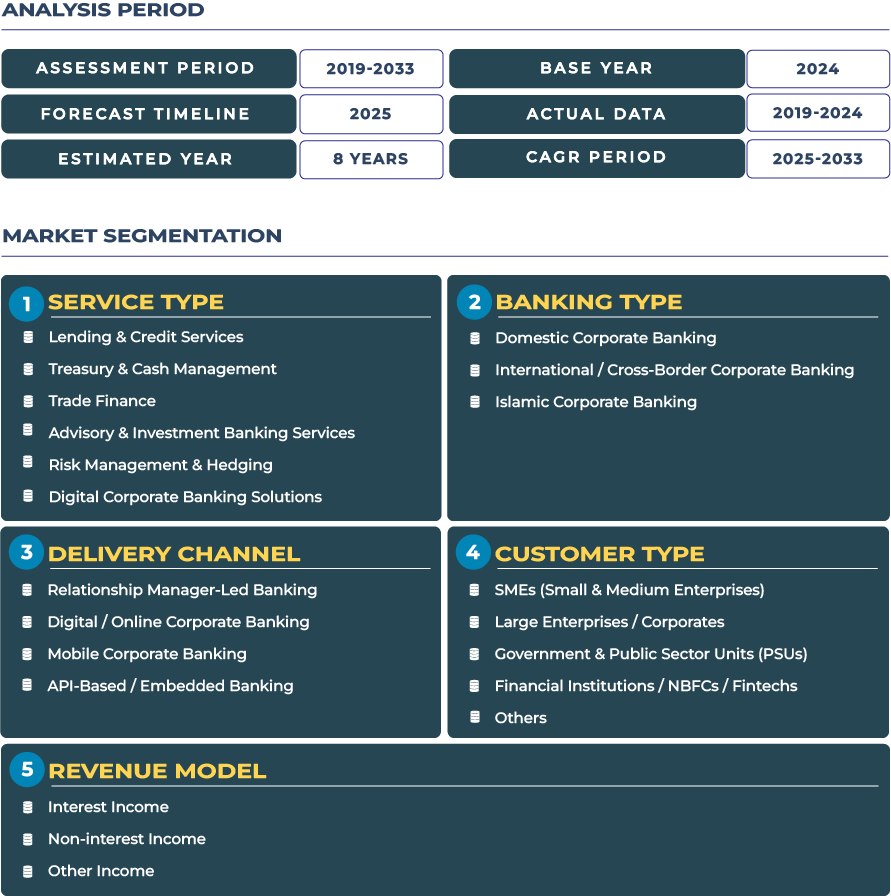Israel Corporate Banking Market Outlook: Powering Innovation and Enterprise Growth Through Technology-Focused Finance
The Israel Corporate Banking Market stands at the intersection of financial innovation and technological leadership, serving one of the world’s most dynamic startup ecosystems. As Israeli corporates continue to lead in deep-tech, cybersecurity, and life sciences, the demand for advanced corporate banking solutions has intensified. Banks are evolving from traditional lenders to strategic partners, offering tailored credit, venture debt, and cash management systems that align with innovation-driven business models. Valued at USD 3.6 billion in 2025 and projected to reach USD 3.8 billion by 2033, the market’s steady expansion reflects a maturing financial system that caters to high-tech enterprises while navigating regional and regulatory complexities.
Note:* The market size refers to the total revenue generated by banks through interest income, non-interest income, and other ancillary sources.
As Israel continues to consolidate its position as the “Startup Nation,” corporate banks are aligning with national innovation policies supported by the Bank of Israel and the Israel Innovation Authority. From digital lending tools for SMEs to global treasury and FX management systems for multinational tech firms, Israel corporate banking landscape is embracing technological sophistication. This digital-first approach is enabling better liquidity management, real-time risk assessment, and seamless cross-border transaction capabilities, thereby enhancing the nation’s global financial competitiveness.
Technology-Led Corporate Banking Anchoring Israel’s Innovation Economy
The Israeli corporate banking sector has evolved into a critical enabler of innovation financing. As startups transition into mid-size enterprises and global corporations, their need for complex financial structures, trade finance, and global cash management solutions continues to expand. The corporate banking ecosystem in Israel now integrates digital tools with advisory services, ensuring that companies in sectors such as artificial intelligence, defense technology, and biotech can access both working capital and strategic financial guidance.
Israel’s stable macroeconomic fundamentals, low unemployment and consistent export-led GDP growth, provide a favorable backdrop for the corporate banking industry. However, the ongoing geopolitical environment, including regional tensions, has reinforced the need for risk management frameworks and diversified lending portfolios. In response, banks are deploying enhanced risk modeling systems and automated compliance tools to maintain business continuity and trust among enterprise clients. These factors collectively underscore Israel’s reputation as a resilient and technology-driven corporate banking hub.
Drivers & Restraints: Innovation, Export Dynamics, and Regulatory Complexity Shaping the Market
High-Tech Exports and Innovation Banking Fuel Market Growth
Israel’s strong tech export base, accounting for nearly 50% of its total exports, continues to be a primary driver of corporate banking demand. Major corporates and mid-sized tech firms require specialized R&D financing, project-based lending, and venture debt facilities to scale globally. This dynamic has prompted Israeli banks such as Bank Leumi and Bank Hapoalim to expand their innovation-focused corporate banking services, particularly in fintech and startup ecosystems. The integration of AI-powered treasury management and corporate cash flow analytics tools has also accelerated efficiency for exporters and enterprise clients operating across North America, Europe, and Asia.
Geopolitical and Regulatory Uncertainty Creating Market Friction
While technological advancement is the market’s core strength, political instability and regulatory shifts remain significant challenges. Regional tensions and policy volatility can affect cross-border lending, capital mobility, and corporate risk assessment. Additionally, Israel’s highly concentrated tech export sector exposes corporate banks to sectoral concentration risks, making portfolio diversification imperative. The country’s regulators, led by the Bank of Israel, have been working to enhance corporate governance frameworks and financial stability standards to mitigate such risks. Despite these efforts, evolving fintech regulations and cybersecurity concerns continue to test the industry’s adaptability.
Trends & Opportunities: Fintech Synergies and Digital Treasury Solutions Redefining Corporate Banking
Corporate Treasury Automation Transforming Enterprise Financial Management
Corporate banking in Israel is witnessing a surge in treasury automation and digital financial operations. Technology firms are increasingly adopting AI-driven cash management and FX optimization platforms to streamline liquidity and hedge currency exposure. Cloud-based corporate banking systems are replacing legacy infrastructure, enabling CFOs to execute real-time transaction monitoring, automated reconciliation, and predictive cash flow analytics. This digital evolution is especially pronounced among firms listed on the Tel Aviv Stock Exchange, which are expanding into new markets and require robust global treasury capabilities.
Opportunities in R&D and Receivables Financing for High-Growth Enterprises
Israel’s vibrant R&D ecosystem presents vast opportunities for corporate banking sector innovation. As more startups transition into mid-cap enterprises, demand for structured receivables financing, venture debt, and corporate API integrations continues to grow. The rise of venture-linked lending models enables banks to align financing with the lifecycle of innovation companies, reducing default risk while supporting scalable growth. Moreover, the government’s continued support for export credit facilities and collaborative fintech sandbox initiatives creates an enabling environment for next-generation corporate banking products tailored to R&D-heavy businesses.
Competitive Landscape: Strategic Partnerships Defining the Future of Israel Corporate Banking Industry
The competitive landscape in the Israel Corporate Banking Market is shaped by the interplay between legacy banks, fintech innovators, and global financial institutions. Major banks such as Bank Leumi, Bank Hapoalim, and Israel Discount Bank are intensifying their digital transformation programs to capture new corporate segments. In 2024, Bank Hapoalim launched its “Next Corporate” digital banking suite, integrating APIs for cash flow monitoring, multi-currency management, and fintech partnership modules. Similarly, Bank Leumi expanded its innovation banking division to provide tailored financial services to technology startups and export-driven companies.
Corporate banks are also investing in cybersecurity and AI-based compliance technologies to manage growing digital transaction volumes. Collaboration with fintech startups enhances agility, allowing for faster product launches and customized client experiences. This evolving ecosystem positions Israeli banks not merely as financiers but as strategic enablers of enterprise innovation and resilience within the broader corporate banking landscape.







